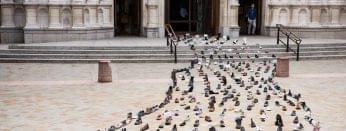A number of charities in the Caritas network have engaged with the Bishops’ Conference on the question of any additional support to be made available to EU citizens living in the UK, in the light of potential changes in the country’s relationship with European Union institutions.
Bishop Paul McAleenan, the lead Catholic Bishop for Migration and Asylum, has issued a statement on the government’s forthcoming Settlement Scheme for EU citizens living in the UK. Any EU citizen who wants to remain in the UK after Brexit (with the exception of Irish citizens) will have to apply through the scheme, expected to launch in March 2019.
Full Statement
The Catholic Church in England and Wales stands in solidarity with all EU citizens who have made their home here. As the majority are themselves Catholic this is a special pastoral concern for us. The Church has experienced first-hand the extensive contribution that people from across Europe have made to our society. They are an integral and valued part of our parishes, schools and communities. We also recognise the evidence that immigration from Europe has not undermined opportunities for UK citizens, but rather brought considerable economic and social benefits.
It is clear that since the 2016 referendum many people living here have faced profound uncertainty and insecurity about their future. Although the reassurances offered by senior politicians are important, people have been given far too little information or binding commitments about their right to stay. For some this has been worsened by the appalling rise in hate crime, which has left them feeling unwelcome or even threatened in the country that has become their home.
The government will soon launch a Settlement Scheme, offering EU citizens living here a legal route to remain. While this is an important step we understand that, especially for people who have contributed to our society over many years, it may feel unjust and divisive that they are now required to apply for permission to stay. We also expect that some people, particularly those who are already vulnerable, may face difficulties in practically accessing the scheme, leaving their immigration status at risk.
We strongly oppose the decision to charge people for securing the rights they already have. This is not only unprincipled but will also create a barrier for larger families or people facing financial difficulties. The Bishops’ Conference has made representations on these issues to ministers and through the Home Office working groups set up to discuss the Settlement Scheme. We will continue to do so as it is implemented.
Notwithstanding our concerns about these principles and practicalities, it remains a fact that EU citizens must apply if they are to protect their existing rights and their place in our society. We therefore ask Catholic parishes, schools and organisations to bring the Settlement Scheme to the attention of all who need to avail of it and to be aware of vulnerable people who may face barriers to applying or not realise that they need to apply. In particular we encourage you to signpost people towards the official information on the Settlement Scheme, and to make use of the various information resources available. Finally we urge the whole Catholic community to take up Pope Francis’ call to welcome, protect, promote and help to integrate everyone who has made their home here – with particular concern at present for our European brothers and sisters.




